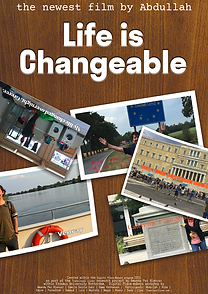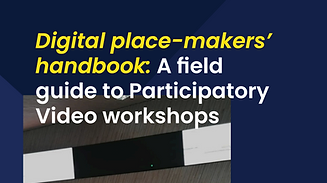

Digital Place-makers
A Participatory Video program for experimenting with new media technologies to create empowering narratives.
Contact: Camila Sarria Sanz, camilasarriasanz@gmail.com
What is place-making? How do migrants use technology and digital media to make place in new environments? And how could they use that same technology to tell their own place-making stories to inform, inspire and involve both other newcomers and host communities in making a better place?
Digital Place-makers is a Participatory Video program in which participants learn how to use different digital media technologies for visualizing and sharing their perspectives on place-making and belonging while reflecting on ethical technological developments for enhancing newcomers agency through and in the digital.
Throughout six hands-on sessions, participants experiment with both analog (collaging, story-boarding, writing) and digital tools (desktop filming, video-making, photography, voice recording) to co-produce knowledge using their everyday life digital practices as a starting point. Together we created eleven short films that explore how to make a place in the host society, touching on topics like identities, belonging, aspirations, sociabilities, well-being, and livelihood opportunities.
Rotterdam (NL)
September 2021 to February 2022
Participatory Video, place-making, belonging, Rotterdam, filmmaking.
Check out the films!
Homeland
By Hamoud, from Syria
"What is a homeland? Can we change our homeland? We belong to one planet, that is our home, we have to save it."
Hamoud is a Syrian architect living in Rotterdam less than two years. He likes photography, reading and technology. He is interested in learning and team work experience.
Just Try
By Emine, from Turkey
"Often we don't have the courage to start all over again or are unable to accept our reality. Staying in our comfort zone seems the easiest way, even if it means being stuck. But you deserve the life you want. You owe it to yourself. It's never to late to start a new chapter. With my film i want to say that every ending is just a new beginning."
Emine was a manager in her homeland. She has been living in Rotterdam for 1 year. She wants to study to be an illustrator.

Sunny Days are Coming
By Negar, from Iran
"I want to address the plight of refugees, the process of leaving their country and the problems when they reach NL to start a new life, and finally their integration and its challenges. The abilities of refugees are sometimes forgotten in society but can be useful for this country."
Negar is an Iranian woman living in NL for about 3,5 years now. She has an MA in human resource management and wants to rebuild her life using her experience and ability. She loves helping others.
LIFE
By Fereshteh, from Iran
"We have a lot of memories. How can we bring them a little bit with us?"
In her film, Fereshteh shows how to bake an Iranian cookie while talking about the importance of memories. Fereshteh has been living in the Netherlands for almost five years now. She is currently studying and wants to become a teacher.
Life is Changeable
By Abdullah, from Turkey
"My life has changed, and I would like to illustrate with my film what the difference is, because I want to give people inspiration. Everyone has a chance to build a new life."
Abdullah is 27 and from Turkey. He came to The Netherlands on August 5th 2018. Back home he worked as a law intern, now he is getting his master degree at VU Amsterdam.

You Can
By Sana, from Pakistan
"In my film I wanted to tell that there are problems in everyone's life, and I show how I overcame them."
Sana has been living in The Netherlands for 6 years, and is currently studying in Erasmus university. She likes painting and playing guitar, and she loves to eat:)
Bridge Over
By Lula, from Eritrea
"My film shows the importance of a support system, and how networking and taking on a new challenge helps you grow."
Lula from Eritrea has been living in Rotterdam for almost 5 years, but isn't used to the cold weather yet. She is navigating her journey through life by learning and unlearning things, also contributing something to society.

How to Grow a Healthier and Happier Garden
By Zina, from Syria
"In my film I show how difficult feeling useless is. I show that we have basic needs to grow and be fruitful again. Only then we become our real selves again."
Zina is a motivated marketer from Syria. She likes to motivate other newcomers to pursue their dreams as she did, since she understands the challenges as well as their resilience very well.
Stranded Rendez-vous
By Mustafa, from Syria
"We usually choose the places where we live....but the place chose me to live in it."
Mustafa is of Syrian origin.He works in the social field with several organizations, lives in the Netherlands and the world lives inside him. Borders are a lie and passports are expensive paper.

Next Chapter
By Ronny, from Pakistan
"If you think you are alone, nature is always there to talk. The rain will always cry for you."
Ronny is from Pakistan and currently living in Rotterdam. He is both very motivated and good at motivating others, which is what he aims to do in his film.
Outcomes of this initiative
Impact
01
Central to participatory video is the meaningful and active participation by those most affected byan issue. Adopting this approach helped us understand filmmaking and story-telling as tools toempower individuals in sharing their accounts on place-making. Rather than specific guidelines,we focused on providing a broad outline for the creation and curation of content. This allowed par-ticipants to feel in charge of their voice and to make autonomous decisions about the pieces mostrelevant to them in relation to their individual and collective place-making strategies.
02
Placing participants at the center of the process allowed us to address critiques of power imbalances between researcher and researched that are discussed within participatory video methods and that particularly focus on the interference of the researchers and film-makers in the curation of materialin the final films. To safeguard against this pitfall, we not only kept revising and adapting the program on a weekly basis, but we also focused on teaching participants editing skills.
RESEARCH PROJECT BY:
Amanda Alencar (PI)
Camila Sarria Sanz (Coordinator / Researcher)
Emma Verhoeven (Media artist)
Jawer Mawazini (Research consultant)










